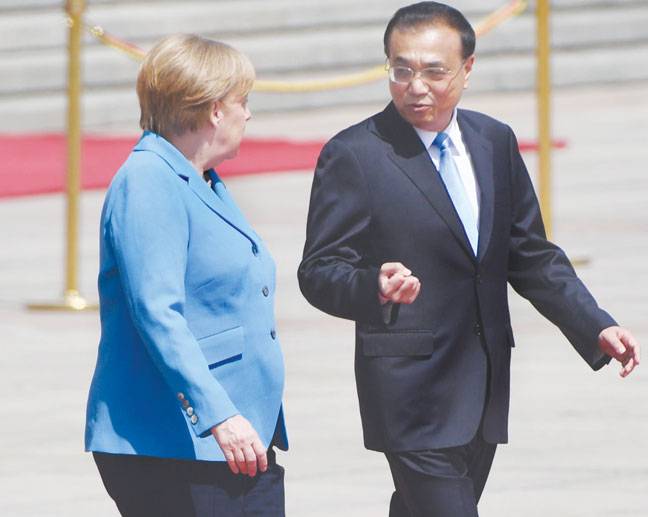BEIJING - German Chancellor Angela Merkel and Chinese Premier Li Keqiang defended the Iran nuclear deal on Thursday, with Li hinting a collapse in the pact would complicate negotiations to disarm North Korea.
The pair also launched a spirited defence of free trade - another issue that the global community feels is under attack from US President Donald Trump’s strident rhetoric - during their meeting at the opulent Great Hall of the People in Beijing.
Earlier this month Trump reimposed US sanctions on Iran that had been eased as part of an agreement aimed at halting Tehran’s nuclear programme.
Li warned that abandoning the deal with Tehran “will not just impact Iran, but also have a negative impact on (the ability) to solve other hot international issues through peaceful negotiations”.
He did not mention North Korea by name, but analysts have warned that Trump’s move has dented Washington’s negotiating credibility ahead of his scheduled meeting with North Korean leader Kim Jong Un next month.
The German leader also sounded the alarm about the economic impact of the move on Europe.
Supporters fear the reimposition of US sanctions could hit European firms that have done business with Iran since the 2015 accord was signed.
If European companies pull out or shrink operations in Iran to avoid falling foul of US law, it would “create an opportunity for businesses in other countries to step in and play a greater role”, Merkel said.
At a meeting with President Xi Jinping, Merkel welcomed Chinese moves to reduce automobile import tariffs and allow foreign carmakers to own a majority stake in joint ventures with Chinese partners.
“We mustn’t rest on our laurels” Merkel told Xi, noting the “world is changing very quickly” and the question of market access and reciprocity was becoming more important as Chinese firms push into Germany.
European and American leaders have long complained that it is difficult to do business in China.
The Chancellor reiterated Berlin’s demand for Beijing to ease barriers on foreign investment, saying the two countries would sign a memorandum of understanding to offer mutual access to each others’ markets for autonomous vehicles.
“China and Germany are on the path of promoting multilateralism and bolstering free trade,” said Merkel, who was accompanied by an industry delegation of 18 German executives.
Merkel was expected to take up the case of Liu Xia, the widow of Nobel peace laureate Liu Xiaobo, who remains under house arrest without charges nearly a year after her husband died of cancer in custody. “We have found a dialogue mechanism where difficult questions can be raised,” she said.
Iran still implementing
nuclear deal: IAEA
Iran is still implementing the 2015 accord over its nuclear programme, just weeks after Washington ditched the accord, according to a report by the UN’s nuclear watchdog.
The International Atomic Energy Agency report, seen by AFP Thursday, shows that Iran is abiding by the deal’s key restrictions on its nuclear facilities in return for relief from damaging economic sanctions. The latest assessment from the IAEA comes after US President Donald Trump withdrew the United States from the accord earlier this month, putting its future in jeopardy.
The IAEA urged Iran to stick with the accord and even go beyond its legal obligations so as to boost international confidence in Tehran’s commitments. A senior diplomat at IAEA headquarters said this was not prompted by any lack of co-operation or change of behaviour on Iran’s part.
The IAEA is “encouraging (Iran) to go above and beyond the requirements” of the deal in order to boost confidence, the diplomat said, adding that Tehran could for example invite inspectors to sites they had not demanded access to.
Signatories Britain, France, Germany plus the European Union, Russia and China have been trying to salvage the deal after Trump’s decision but Iran has warned that if it suffers as a result the reintroduction of US economic sanctions, it could walk away from the accord.
As in previous reports, the IAEA confirmed that the number of centrifuges to enrich uranium at Iran’s Natanz plant had been kept below the agreed level of 5,060, while its total stockpile of low-enriched uranium “has not exceeded 300 kilogrammes (660 pounds)”.
Uranium when enriched to high levels can be used in a nuclear weapon. At lower enrichment levels, it is used for peaceful applications such as power generation - Iran’s stated aim.
Since the deal came into effect, Iran has twice inched over the agreed volume of heavy water, a reactor coolant.
However, the latest report said that for the past three months the volume had remained below the agreed maximum of 130 tonnes.
Apart from the relatively minor breaches of heavy water levels, IAEA reports have consistently shown Iran adhering to the terms of the deal in the two years since it came into force.
In the IAEA’s previous report it had said that Iran had informed it of a decision to “construct naval nuclear propulsion in the future”.
Press reports have previously said that Iran wants to develop nuclear-powered ships or submarines.
The latest report says that Iran has assured the IAEA that more information will be provided in due course and that “for the first five years, no facility will be involved”. On Wednesday, Iranian supreme leader Ayatollah Ali Khamenei said Iran would not discuss its missile programme in any new deal, as demanded by the US, and said European countries had to compensate Iran if it experienced a dip in oil sales. US Secretary of State Mike Pompeo had warned on Monday that Iran would be hit with the “strongest sanctions in history” and cautioned European firms against continuing to do business in the country.
On Friday, the remaining parties to the accord will meet in Vienna at Iran’s request to discuss the implementation of the deal and ways to save it without Washington’s participation.






